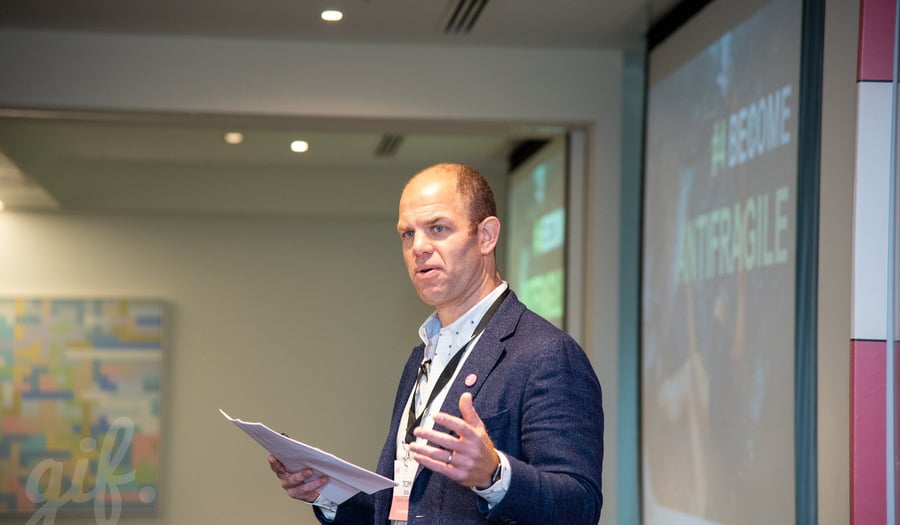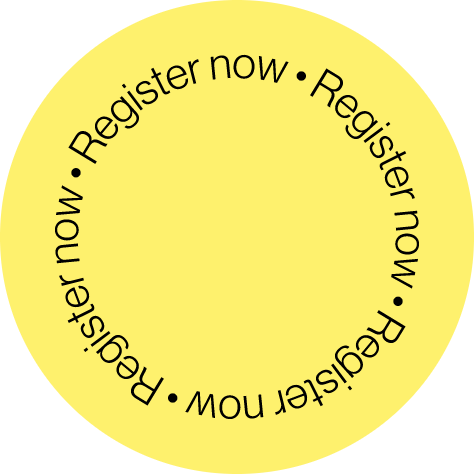This week, we are featuring Tom Ellis, CEO of global insight and innovation consultancy Brand Genetics.
Brand Genetics is a brand growth consultancy – specializing in front-end insight, strategy & innovation for B2C brands. They work in partnership with leading businesses – including ABInBev, Diageo, Mondelez, PepsiCo, RB & Unilever - to solve complex problems and unlock positive growth – growth that adds sustainable business value, makes people’s lives better & has a positive impact on our world. They do this by giving brands a transformative new way to look at their market: human-first – seeing consumers through the wider lens of their lives, not just their consumption.
Your Story

Please tell us about you and your story …
At university I studied history which taught me how to analyse large amounts of information, understand what drove people to make decisions, form an argument and tell stories. It also served as a great reminder of how people have always found ways to make things better – and that is what innovation is all about after all: seeking improvement. And whilst innovation is absolutely about looking to the future, it’s also critical to know the history of where you’ve been, as the past does inform so much of what the future holds.
I also flexed my entrepreneurial muscles – running the college ball, which was a big event. I found myself looking at the concept and how it could be done better before reimagining it - and we ended up doing it in a very different way. So that desire to take ownership, find problems and solve them was important and exciting to me.
But despite this, I had no idea innovation even existed as a career. I thought I wanted to go into management consultancy as it seemed to link to my desire to solve different problems but I actually ended up falling into PR. I was pretty clueless if truth be told, but it sounded interesting and the wonderful thing about PR compared to say advertising, was that you were the account handler, planner and creative, all rolled into one. So it proved a great starting point.
I went to a Snickers innovation workshop, loved it and realised that this was exactly what I wanted to do.
But I knew I wanted something more strategic so I then went to Accenture – fulfilling my management consultancy dream (!) - but I quickly realised it wasn't right for me (and I definitely wasn't right for Accenture). At the same time as I was having this realisation a friend told me about a company she was interviewing at - a place where creative thinking met problem solving, insights and strategy. And I thought yes, that sounds exactly like the type of thing I’ve been looking for. So I applied, got the job and joined a boutique agency called Big Green Door where I really cut my teeth, working across a range of great brands and challenges. On my very first day I went to a Snickers innovation workshop, loved it and realised that this was exactly what I wanted to do.
After climbing the ranks and running what was a small business, I left to join a bigger design agency called 1HQ to lead the insight and strategy side of things. It was almost the polar opposite to Big Green Door which was a real learning curve, but both businesses taught me a lot about the type of work I enjoyed as well as the type of culture I wanted to work in.
And then Brand Genetics turned up at the perfect time and it was seemingly the best of both worlds - intellectually rigorous, but with a clear desire to turn what was an unpolished gem into something that would be commercially successful.
So for me, the path to innovation was long and unsystematic in some ways, but when I look back it all seems to make perfect sense! And I’ve certainly been lucky enough to end up in the prefect place for me.
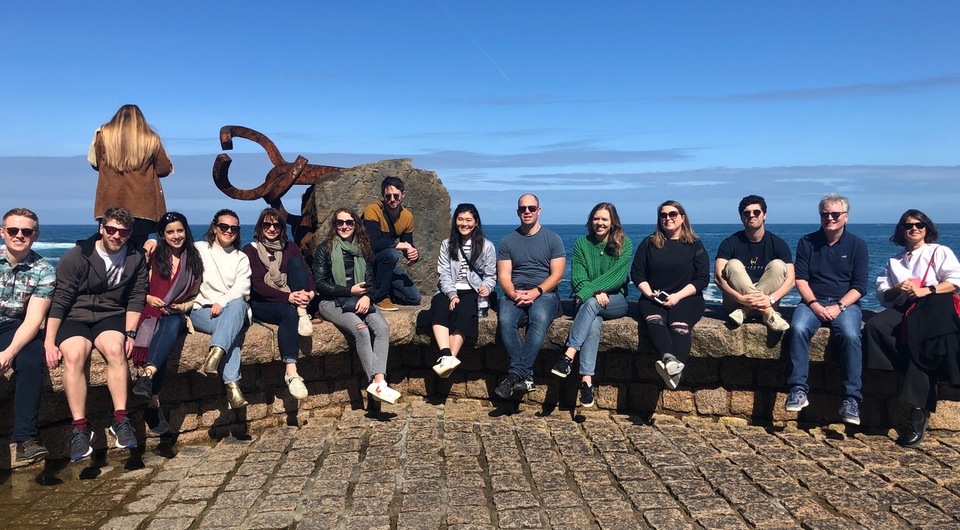
MANAGING CHANGE IN TIMES OF AMBIGUITY AND UNCERTAINTY
Okay, let’s talk COVID. What a yoyo year 2020 was. A very difficult time driven by the unknown, a lack of certainty and of course being challenged by change. It would be great to hear about two things: One, how you have worked with your clients to plan for the future, and two, how you managed Brand Genetics through the pandemic and what you learnt?
Good questions. So let me take that in two parts - first what have we done with our clients. The first thing we had to do was figure out how we would adapt to the new remote reality. A lot of what we do was in-person and face-to-face with client teams: we’re used to flying all over the world, immersing ourselves in different cultures, talking to different consumers and exploring different categories. So while we quickly pivoted to digital approaches, our challenge was how could we continue to bring that rich human understanding and personal touch in a remote and virtual world, ensuring that we didn’t lose our edge. That’s been our priority and we have continually refined and innovated our thinking and approaches over the last year to not just get to parity but in many ways improve on our previous ways of working.
Then there is how we work as a team. The important thing was to recognise the kind of impact the pandemic was having on our team and have empathy and understanding for the different situations we were all in – whether people were at home with their kids or working out of a kitchen or by themselves in a flat. Despite those differences I think that everyone realised we’re all in it together. But the ambiguity around how long this was going to last was perhaps the hardest part; we’ve worked to be transparent and open about not having all the answers – and then been available for our team to talk to and question.
During this period I had three mantras that I wanted to convey and repeated consistently to the team. One, we were in a strong financial position and we aren’t going anywhere – so don’t worry about your job. Two, we have a great team with great client relationships, and what was going on meant we were well positioned to really help those clients adapt and figure out what it meant for them. And three was about setting ourselves the challenge to use the time as an opportunity to emerge even stronger and a chance to really up our game.
We were also really lucky. We had a company away trip to San Sebastian - to celebrate a brilliant 2019 - and we did that just before the pandemic set in. We all had a brilliant time and the team togetherness, spirit and sense of camaraderie from that trip really helped us a lot when the lockdowns came in. So building that kind of social capital amongst the team was almost perfect timing and helped us a lot as we transitioned into a remote world.
The important thing was to recognise the kind of impact the pandemic was having on our team and have empathy and understanding for the different situations we were all in.
And do you think business and the way of working can go back to how things used to be?
There is something called the end of history paradox, where basically we always think of this point in time as being the culmination of change, but we forget that things are going to carry on changing and shifting. So, I think the world will look more like 2019 than it sometimes appears it will right now.
But I think there’s no doubt that there’s also going to be significant change. For example, we're going to do much more from our homes: we’ve spent the last year learning how to educate in our homes, how to exercise in our homes, how to entertain ourselves in our homes. Once restrictions ease the question will be does the ‘old’ way have any advantages over the ways that we’ve developed in the past year. So will Zoom drinks last or will bars and restaurants be busy again? Absolutely the latter. But will people go to the cinema or gym as much now there’s Disney+ streaming the latest releases and Peloton… I’m not so sure.
From a work perspective, the key shift will be a move towards flexible working. Many people are talking about the fact that they can’t wait to get back to the office – but I don't think we will all go back to commuting for five days in an office. We’re certainly going to embrace flexible working (which we already did before the pandemic) but ultimately we are a human-to-human business and we still want to have people together – just with a more hybrid, balanced blend between time in the office and working remotely.
I can also see less business travel – which will be a shame in some ways, as it’s a great way to get under the skin of cultures but I think the truth is we’ve realised that for the cost of a Zoom subscription you can eliminate quite a lot of those business class tickets to New York and of course it’s better for the environment too. So in the short term at least I think that will shift.
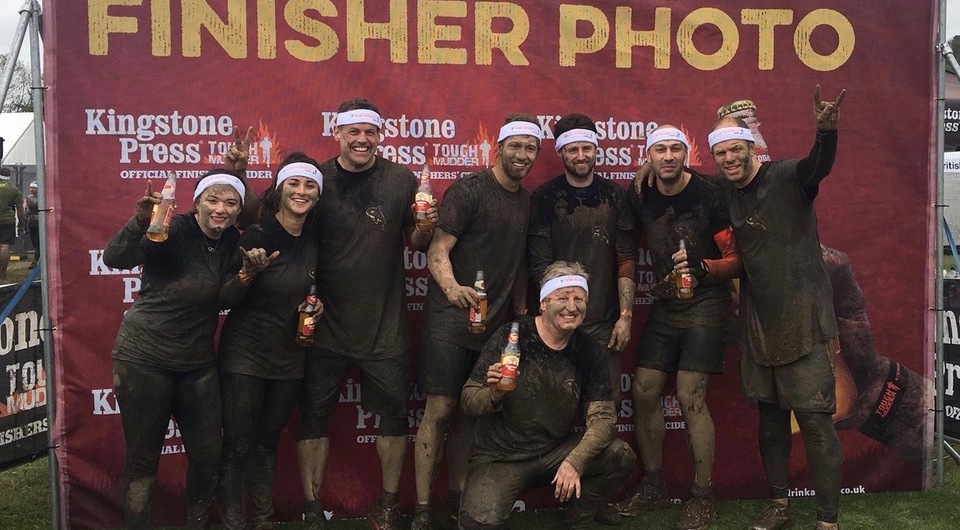
THE EVOLUTION OF THE INDUSTRY
What does the current state of change mean for the innovation consulting industry? And how do you see the service of innovation consulting changing? What do you expect to see next? And who will succeed and fail?
There has been consolidation - with bigger consultancies buying up some significant players in recent years - but I feel it’s inevitable that many of these companies will have their individual cultures subsumed over time and big company life isn’t for everyone. I think COVID may accelerate the frustrations of those that enjoyed the independence they had prior to being acquired. This links to the supercharged importance of work-life balance as well as the importance of team togetherness and trust.
Ultimately my criteria for future success is not big or small, but I think there are principles that will impact innovation moving forward and which future success will embody.
I think Agile will expand from large meaning ‘fast’ to increasingly reflecting and ability to adapt and flex at speed, so the ability to be nimble - quick and light in movement or action – is one key factor I think will be important. Companies will need to set a purpose and a vision, along with some guidelines, but ultimately let the people they hire figure out how to solve the problems.
Then it’s about replicable models and intellectual capital. Corporates are going to be more careful with their money so they are going to be looking for consulting partners where they know if they invest then they see results. If the answer to how we get to great innovation is the equivalent of ‘magic’, then clients will look elsewhere pretty quickly because it’s not repeatable.
I think we will see more networks win over closed shops – Joy’s Law states that “no matter who you are, most of the smartest people work for someone else”. It becomes more about how you can harness and bring together the right brains for the right challenges and jobs. And so your network is going to become really important. It will be a bit like putting a film together: you start with we’re going to make an amazing movie, then you select the right director, you select the right actors, and you select the right crew.
We specialise in complex challenges and to do that I believe diverse teams and collaborative thinking are critical.
Further, we specialise in complex challenges and to do that I believe diverse teams and collaborative thinking are critical. That’s not just diversity by age, sex, race, creed (though that’s important), but cognitive diversity – people who think differently about these things. At Brand Genetics, we have a team with a really diverse range of backgrounds and experience, but also perspectives and personalities. This is what we look for: people who can bring a fresh outlook and add something different or new. It is this kind of culture that makes the work all the more interesting and insightful.
Finally, I think human will win over corporate – I think this one is perhaps the most important. Over the pandemic we have learnt how work can and must coexist healthily alongside personal life. Balance is key; but the edges are blurred - companies like Brand Genetics that truly value the human side of their teams and their clients will ultimately succeed as creativity and complex problem solving – of the sort needed in innovation– are fundamentally human endeavours.
But ultimately we are all in a world that is really exciting for insight and innovation because of the paradigm shift that has taken place in the last 12 months. Take the growth of digital shopping: what would probably have taken 10 years has occurred in less than a year. And companies need to figure that out fast. These are complex challenges and the winners will understand those changes and adapt to take advantage of them before the competition – that’s exactly how we’re helping our clients emerge from this situation.
BRAND GENETICS
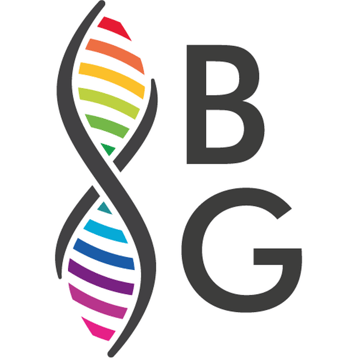
Showcasing your secret sauce. How Brand Genetics is exciting and different. Your approach to solving for client challenges + how you deliver impact.
A real human focus embodies everything we do - from how we work on challenges to how we work with – and treat – one another.
We believe the best driver of innovation success is really understanding your consumer or customer – indeed trying to understand them better than they understand themselves - and using that insight to guide creative solutions. So we’re obsessive about understanding that consumer first and foremost as a human being – as that is where you will find the most revelatory insights that offer competitive advantage. So we start by looking to psychology and behavioural science to see what frameworks already exist that we can usefully apply - so we already have insights that we want to explore when we start working with consumers.
Then we’re forensic in understanding what people are doing and seeing how this fits (or doesn’t fit) with their broader goals and motivations, understanding the sort of obstacles they might face or spotting opportunities to delight them. It’s fashionable to talk about this process of discovery in terms of ‘design thinking’, but we want to reclaim human understanding from the world of design alone! Bringing more diverse perspectives to this stage unearths more diverse solutions: design isn’t the answer to everything!
I’m often asked what’s the difference between human understanding and consumer understanding – is it just marketing semantics? But to show the difference take beer (we work a lot in beer): it’s important to remember that even if I’m a real beer lover I’m only really ‘consuming’ it for a tiny percentage of my daily life – but you’re human 100% of the time. That’s what we’re looking to understand – how consuming a beer fits into your wider life. You’re not having a beer because it has a high or low alcohol content or more hops or whatever, you're drinking it because it helps you bond with your friends or because you've had a shitty day and you just need to take the edge off. Those are the real motivations - it’s about what you’re trying to achieve in life rather than whether this is objectively the best beer on the shelf.
So looking at things through a human – rather than consumer – lens means you are able to widen your perspective on the challenge and unlock new opportunity spaces that you’d never have spotted before. It helps our clients move from a narrow consumer and category lens to one that allows them to see the world and humans differently.
Bringing more diverse perspectives to this stage unearths more diverse solutions.
We also champion positive innovation - innovating for human happiness and wellbeing – as the way forward. Making positive innovation a key goal helps humanise innovation and taps into a fundamental and universal human goal; the pursuit of happiness. And there’s a compelling business logic for positive innovation too – people believe happiness and wellbeing is well worth paying for; the global wellness market is now worth $4.2 trillion, four times more than the global pharmaceutical industry. We need more happiness in the world right now and hopefully – by working with our clients – we can help them put a smile on people’s faces!
When it comes to our culture and how we work together as a team, we believe that we are all uniquely human – and bring different strengths and perspectives to the party – so we want to celebrate and enable that. Being a human business also means looking after one another and knowing that others have your best interests at heart.
It’s also about being able to enjoy your work. We’ve certainly got a fun culture and a team that that enjoys each other’s company – we value the times when we’re all together (now more than ever): we have a great Christmas and Summer party plus we’ve recently introduced away trips like San Sebastian to help celebrate achieving company milestones as a whole team. And after all this I can’t wait for the next one – we’ve got Amsterdam on the cards for 2022!
During COVID and lockdown to keep this spirit going – I won’t lie, it’s been tough, but we’ve also seen a different side of people and in a strange way got to know one another better. We’ve had quizzes, cook-alongs, a Bollywood Night, Through the Keyhole – all sorts really. We ran something called 15 Minutes of Fame where everyone was given a spot to talk about something they were really interested in which was a lovely insight into our different personalities. And we’re continuing to seek new ways to just get together and have fun away from ‘work’ – but I think we’re all looking forward to the time we can do it in person again.
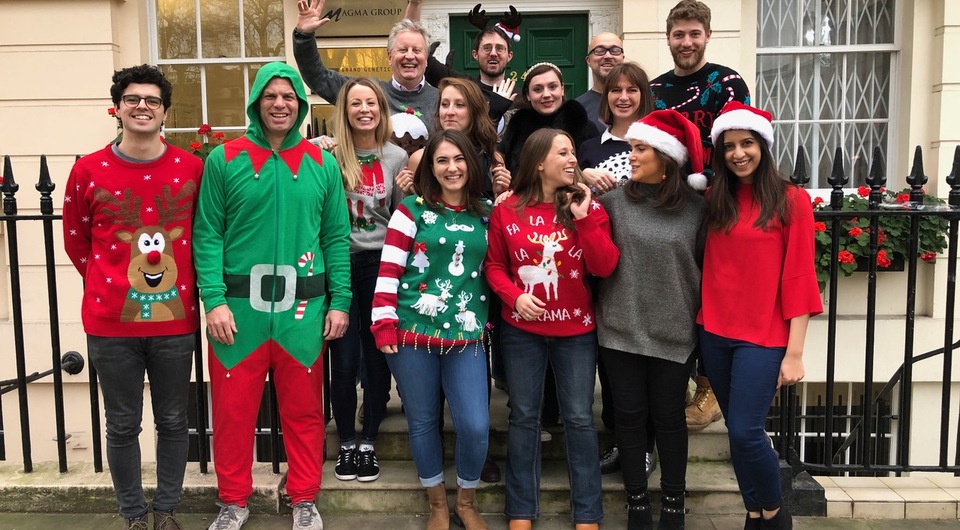
EDUCATING THE AUDIENCE
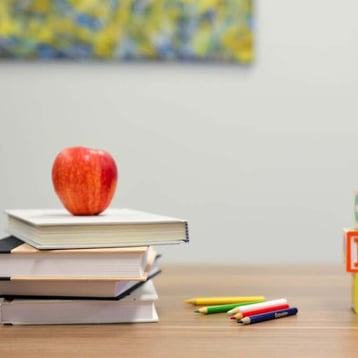
Giving advice to those looking to break into innovation consulting. What would you tell your former self?
Okay, let me try and summarise this in a few key points.
· Do your research: This should go without saying, but I’m always amazed by how many people don't really get what we do and think we’re basically an advertising agency. Also, don’t just say you’re passionate about innovation – demonstrate it, either through what you do or what you know about.
· Be T-Shaped: Get clear on what it is that you are – or have the potential to be - really, really good at: this is your depth and expertise. But don’t sacrifice breadth of interest – continue to explore a wide variety of things – this ‘T-shaped’ combination is a real winner in innovation.
· Show Curiosity: If there's something we really look for its intellectual curiosity. That desire to learn new things from new places. We want inquisitive minds who are actively seeking out new ideas, perspectives and interests.
· Bring Confidence with humility: We’re entrepreneurial as a business and we want people who are confident enough to have a go at something new, even if they know they won’t get it right first time – it’s what we call ‘comfortably uncomfortable’. But they also need to be willing to ask for help – it’s a sign of strength, not weakness – and that balance is really positive.
· Take a risk: The biggest regrets in life are not about what you do and fail at, but about the opportunities that you don't take. We want people who aren’t afraid to take a risk and make a mistake. Innovation involves a lot of ‘positive failure’ – failing in the name of progress - the more you fail, the more you learn and we need people who are up for that.
The biggest regrets in life are not about what you do and fail at, but about the opportunities that you don't take.
WORDS OF INSPIRATION

And to close the session, it would be great to finish on some words of inspiration. What makes what you do rewarding and why do you do it?
The money, just the money!
In all seriousness though, I break it down to the three P’s: people, problems, perspectives.
· People: I’m the envy of a lot of my friends because I work with a fantastically diverse team, full of fresh thinkers who are doing really interesting things – plus they’re also great fun to be around. And we also have great clients too, who are always challenging us and we’re always learning from.
· Problems: The human brain is there to solve problems and we’re challenged to solve really interesting ones for our clients (plus plenty of our own too!). The journey to a solution is rarely straightforward but - when you crack it - the satisfaction of having made a positive impact is a fantastic feeling.
· Perspectives: I get to see the world through the eyes of different people – all over the world from different walks of life. I’ve travelled the world with Brand Genetics and when you’re somewhere very different looking at lives through the lens of beer, or chocolate, or toilet cleaner, it is a strangely rewarding perspective. It’s fascinating and it helps to see things afresh and challenge the status quo.
I would also say that we’re also living in a sort of golden age for innovation. I chaired the Global Innovation Forum and I used an Avengers analogy this year: “Innovators assemble”! This is innovation’s time: almost every business has needed to change something fairly fundamental and the disruption of COVID means they’re much more open in their thinking. So it’s a truly exciting time to be in innovation and I feel like now more than ever we can effect real change.

